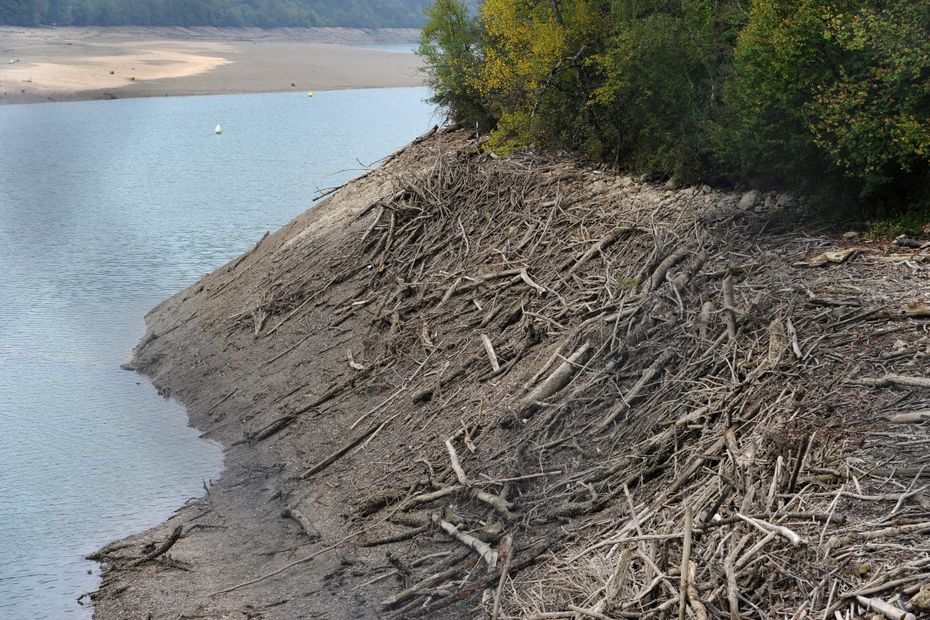The dry spell has set in and should last according to Météo France forecasts. River levels are falling. Consequence: the prefectures are issuing more and more restrictive orders, particularly in Aveyron and Tarn-et-Garonne. The point in the departments concerned.
The dry and increasingly hot air masses contribute to the drying up of rivers and waterways. The prefectures are taking increasingly restrictive measures concerning withdrawals from the drinking water network in particular.
In Aveyron, level 2 is activated. The following restrictions apply across the department:
• ban on washing vehicles with the exception of professional stations equipped with water savers, except for vehicles with a regulatory or technical obligation and for safety-related organizations
• ban on upgrading private swimming pools from 8:00 a.m. to 8:00 p.m.
• ban on cleaning or watering terraces, exterior floors and facades (with the exception of cleaning squares after markets)
• ban on watering lawns, public and private green spaces, pleasure gardens, sports areas of any kind from 8 a.m. to 8 p.m. (vegetable gardens are not affected)
• industrial and commercial activities must limit their water consumption to what is strictly necessary. A sampling register must be completed weekly.
” We invite all users to get closer to their municipality to keep themselves informed of possibly stronger local restrictions taken by the town hall” specifies the prefecture of Aveyron which mentions that a reinforcement of the restrictive measures is necessary for the direct takings in the rivers.
–
This reinforcement concerns, from July 23, the Alzou which passes to the crisis level, the Diège, the Dourdou de Conques, the upstream and median Aveyron, the Viaur basin (Céor), the Rance as well as the Hérault which enter on heightened alert, the upstream Lot on alert and the downstream Aveyron which are on alert. The prefecture recalls that all the measures implemented in the other basins remain in force.
The flow of rivers is collapsing, including on large rivers . This is the observation made by the prefecture of Tarn-et-Garonne which explains that evaporation and the warming of waterways degrade water quality.
” Our great rivers, Garonne, Tarn and Aveyron, have only held up until today thanks to successive releases, from reservoirs and dams upstream managed by EDF, the Compagnie d’Aménagement des Coteaux de Gascogne and the councils departments of Tarn and Tarn-et-Garonne, the first having started last Mayexplains the prefecture. Some dams are beginning to drain heavily, even though they must be able to last all summer for all uses: agricultural, industrial, drinking water and also energy“.
This situation happens very early in the season, further specifies the prefecture. In this context, the drying up of small rivers continues throughout the department: all non-replenished rivers are subject to withdrawal restrictions, or even a total ban. In a press release published on son sitethe prefecture specifies the uses of water for farmers and for individuals in orange (level 2) and red (level 3).
–
The measures concerning individuals, communities, hotels and private residences are the same for levels 2 and 3: ban on taking water from 8 a.m. to 8 p.m. to water vegetable gardens and greenhouses, total ban on watering sports grounds, lawns and green spaces, to fill ornamental lakes and swimming pools (including the upgrading of swimming pools), to wash vehicles, roofs and buildings. On the other hand, the filling of swimming pools in communities and campsites is not subject to restriction.
The prefect of the Lot has decided to strengthen the measures to limit the use of water in the department. Most of the rivers in the department are therefore subject to restrictive measures. They are increased to the “enhanced alert” level, according to a press release published this Thursday, July 21, not only in Quercy-Blanc and in the Dordogne basin, but also now for certain tributaries of the Lot.
Restrictions concern withdrawals from certain environments, in particular for agricultural irrigation but also for other uses (watering gardens and sports grounds, filling swimming pools and bodies of water, washing vehicles, etc.). In the basins concerned by these measures, the maneuvers of the valves of the hydraulic structures are also prohibited.
The total ban on certain levies is maintained on the Séoune, Lupte, Lemboulas, Céou, Bléou, Ourajoux and Tournefeuille and now for Lendou and Mamoul which are reaching crisis levels. The filling of water reserves, hill reservoirs and other bodies of water by pumping or taking water from the resources in a situation of alert, heightened alert or crisis is prohibited.
With the exception of watering carried out by a device held by hand, samples for watering gardens (amenity and vegetable gardens), lawns, green spaces and sports fields, operated in resource basins in a situation of he alert, heightened alert or crisis are subject to restrictions or even prohibitions.
Ditto for the filling of swimming pools and the washing of vehicles: they are prohibited in areas in a situation of alert, heightened alert or crisis. The restriction measures can be consulted, commune by commune, on the website PROPLUVIA.
Given the unfavorable evolution of meteorological conditions and the state of hydrological resources in the Adour Gersois basin, the prefect of Gers has placed, by prefectural decree, the territory on drought alert jointly with the prefect of Landes.
” The state of vigilance is a measure of anticipation. Its purpose is to raise awareness among the general public and water users (individuals, communities, businesses, farmers, etc.) of the current situation of water resources and the need to adopt water-saving practices.“, mentions the prefecture which calls for ” rational and economical use of water resources“. Local authorities, professionals and all users are thus invited to monitor their water consumption.
The prefecture also recalls that the only samples authorized for irrigation use are those issued by the administration. It encourages the inhabitants of the Gers to find out about the restrictions that concern them, municipality by municipality, by activating from son siteconnecting to a dedicated card.
In the Tarn, the prefecture applies a total restriction of water withdrawals from the watersheds of Agros, Assou, Bagas, Tescou before the confluence with Tescounet, En Guibaud, Bernazobre.
In the Bernazobre catchment area, the following are also prohibited for the communes of Escoussent, Navès and Saïx: the complete filling of swimming pools, the washing of vehicles outside a washing station, the cleaning of terraces and facades that are not subject to work, watering lawns and green spaces, filling swimming pools to level them during the day and daytime watering vegetable gardens.
Despite very significant destocking from the hydroelectric reservoirs of Ariège (representing a third of the water of the Garonne in Toulouse), the flow of the Garonne downstream (at Lamagistère) is particularly low.
Due to the observation of early and intense low water levels, the restrictions on withdrawals have been reinforced on the small non-replenished and non-instrumented rivers in the department, with a total ban from July 16, 2022, including on the Tescou. The rivers connected to the Neste canal and to the derived canals are under vigilance.
The applicable measures are to be consulted on the prefecture website. They do not imply restrictions but a strong incentive for all users to save water.
The “vigilance” measure, the first level of the crisis plan for managing the low water level of the Adour in the Hautes-Pyrénées is activated.
Given the meteorological and hydrological situation in the department, the prefect issued an order prohibiting the practice of flood irrigation. It calls on irrigators and all users to manage water sparingly.
–



